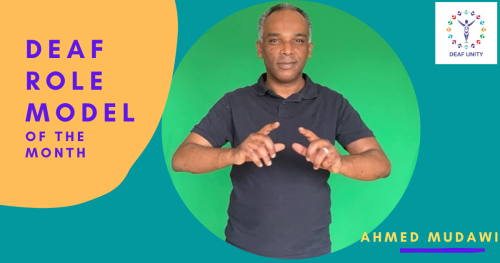
Each month we invite an inspirational or outstanding deaf role model to share their story. From what they’ve learnt, to what they wish they’d have known and their best deaf tips.
Our role model this month is Ahmed Mudawi – we know his face from his various presenting roles, but do you know the man? Read his story here or watch the BSL version below.
1. Please tell us a little about yourself?
You asked me to tell you about myself. Well, I’m from Sudan. I moved here when I was 6, because education for deaf people in Sudan is very limited. I have a deaf older sister, Omeima, and she went through the same difficulties as me. When I was in nursery, I didn’t understand anything that was going on around me. At that time, I didn’t know I was deaf and I just kept wondering why it was different for me and why it was so difficult to communicate. My sister had been through it and she realised that I would go through the same difficulties as her. It was the wrong environment for us and the schools didn’t suit us. My sister had a discussion with my father, and it was decided that, as a result of my deafness, we would move to the UK. London was very different from Africa and I didn’t understand any English. I started going to Sir Winston Churchill School for the Deaf, in East London, and I finally felt that I’d found my place.
The other children and I were the same, and they used sign language too! It was then that I realised that I was deaf, and that being deaf was the reason that I didn’t understand other people. I was learning more and more, and continued using sign language. Unfortunately it was an oral school, so we had to lipread in lessons and we weren’t supposed to use sign language – but we always found a way and signed together in secret.
I then left school and needed to think about what to do next. Back then, the BDA (the British Deaf Association) was based in central London. It was a great area, in Trafalgar Square, I don’t know if you know it? Anyway, they were running the London Deaf Video Project. The project is long finished now, but it was about improving access to information for deaf people and providing signed translations of English information. They brought me on board with the project as a school leaver and they gave me a presenting job. I was nervous but I was with other deaf people.
I was young, about 16 or 17 years old, but it went well and I enjoyed it. I was interested in photography and looked at doing a photography course. However, I realised that, although photography was fine, it wasn’t quite for me, so I started focusing more on TV and the presenting work. Around 2000, when Vee TV was getting started, I was trying my hand at various different things to see what I liked – acting, theatre, whatever opportunities came up. I was young and wanted to try everything out. I found that I liked TV and I started working with 2 other deaf women. I knew them well from our social lives and we worked really well together. That was when Vee TV started – it was a great production and team, and great for it to run on Channel 4. A drama called Rush was added in to Vee TV, which was written and directed by Ray Harrison Graham.
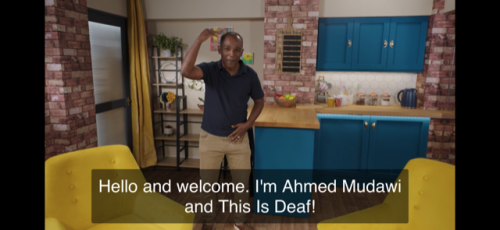
That work only lasted for 3 months, so I needed another job to keep me going and pay the bills. I thought I’d have a go at a support worker role in a residential care home. Over the next 6 years, I worked my way up, working in outreach and then in supported living accommodation, and continued presenting on Vee TV at the same time. Then I became a team leader and with the extra responsibilities, I felt I couldn’t continue doing both, so I stopped working in TV.
Now I’m training to be a translator and a deaf relay interpreter. For a long time, I didn’t think I had any experience in that sort of work. However, in my social care job, deaf clients often showed me the letters they’d received, about GP or hospital appointments, council tax, benefits and all sorts of things. They were worried that the letter was serious, but I’d have a look, explain to it them and reassure them. I realised that doing that is using my English translation skills, I just didn’t have any confidence in my skills. I think it’s important that I gain that experience and become confident so that I can be using my skills in that way.
I am married and have 2 children.
In terms of my achievements, I think the biggest thing over the years has been recognition. When people know that I’m Ahmed and that I’m a presenter, that’s a recognition of my work. Secondly, in February/March time, I was nominated for best TV presenter in the mainstream hearing awards in the north east region. That was for my work on This Is Deaf, which is produced in Newcastle by Signpost, for BSL Zone. All the other nominees were hearing and congratulations go to the person who won. The judges said the competition was stiff and that although I didn’t win, I received a commendation from them. I felt that was great recognition and a real achievement.
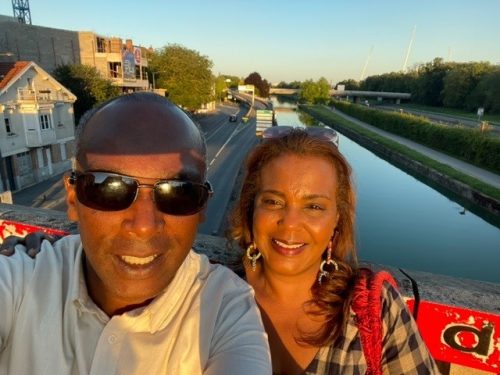
2. You come from a family with other deaf members – what was that like?
Omeima is deaf and we’re very close. She went into the art world and I went a different way, into the grassroots deaf community, getting involved in football and other things. She often takes me into her world and we go to art galleries and other events together.
My family’s main language is spoken Arabic and their second language is spoken English. I use sign language and have picked up bits of Arabic and of course English is part of my BSL, and sometimes I use a mixture. When I visit Sudan, I use the Arabic Sign Language they use there, and when I’m here I use BSL.
3. You have been on our TV’s since Vee-TV in 2001 – what led to your success in your presenting role?
The other two deaf female presenters, Rebecca Mansell and Nikki Beech and I were a great support to each other. We worked so well together and that really helped it take off, and we made it our own. I don’t know what it would have been like if I was by myself trying to make it work – perhaps much more difficult. The three of us together were wonderful and it was very supportive.
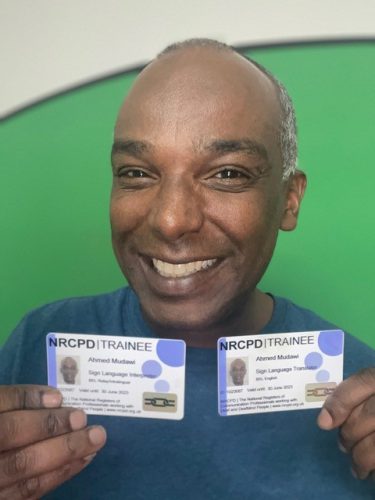
4. How has representation of deaf talent in TV – in-front of and behind the camera – changed since the days of Vee-TV?
How can we represent deaf people’s skills in TV, whether it’s getting in to presenting or behind the camera, doing editing, captioning, creating stories or whatever? I think what is important is that we see black deaf people doing those jobs. Over the years, there have been a couple of role models for the younger generation to look up to, but most people say that when they were younger, there were none. That’s a painful reality. I think about what my responsibility is and what I can do to move things forward. The issue of representation of the black deaf community is really important, and that’s across editing, directing, filming, acting, presenting, translation and deaf relay interpreting work.
5. You were involved in the 2021 ‘Dismantling Racism’ piece, directed by David Ellington, in the wake of the BLM movement – what reflections do you have on that film’s message?
You asked me about my involvement with the See Hear piece that David Ellington directed. He is brilliant. That See Hear episode was the first ever black deaf documentary focusing on the topic. There have been other documentaries over the years – people say there aren’t any but I’ve seen them myself. A long time ago, Kevin Buckle was on See Hear talking about deaf clubs and the strong black culture to be found there. However, David’s documentary was the first to talk about racism, with black deaf contributors sharing what it’s like to experience racism, linking in with BLM. It was a very sensitive subject and it lifted the lid on some very raw and very real emotions and experiences. It was politically difficult and David fought to keep it authentic. For example, some signs are not appropriate anymore, such as the sign for ‘Africa’ where a closed fist moves in front of the face, and some people felt we shouldn’t talk about things like that, that it was too sensitive. But it was important that we did discuss it and that people know the truth. The BBC let us air it and the response to the documentary was really positive. Most people said they’d never really thought about it much before, and that was what we were trying to address. It was very powerful.
As well as sharing my experiences and discussing it with others, part of the experience for me was seeing how we could express these things in the right way and deliver a good message. Also, most of the research team and the filming team were black, and that teamwork was really important.
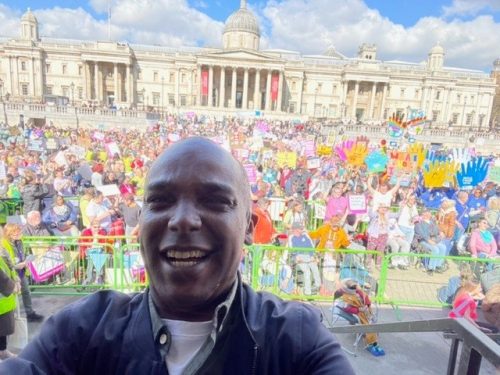
6. With the recent influx of refugees, and your own experiences of coming to the UK shared in ‘Found in the UK’ (2018), what advice would you give to any deaf person who finds themselves in a new place without a network to find their deaf identities?
My experience was different to that of refugees. My family moved here because of the education system and we had a house and could pay the bills. That’s different to refugees who are starting from scratch. When I arrived, my aim was to learn to read and write English so that I would be ready in later years to go out into the world and meet people and communicate. Language is really important.
You mentioned ‘Found in the UK’, and I’ve told you about how I moved here. My advice for new arrivals? It is hard, needing to get everything set up. It is still hard to be honest, arriving without a group of people around you. For black people, I would advise them to find BDUK on social media. BDUK has people living all over the UK. Post a message and then connect with people who reply that are local to you, and you can start meeting people. You can also contact local services such as deafPLUS, RAD, Deaf Unity, etc. Meeting people is an important first step. Once you’ve got some support, maybe start to study. You have to work hard. You need to be committed and work to achieve your goals. Then your confidence will grow, you’ll know more and things will be less stressful, which is important. I’ll give you a quote – “Is power what’s really important? No, it’s knowledge”.
7. You present the TV show ‘This is Deaf’, what has been your favourite episode so far?
I love working with them and it was a brilliant team. Initially it was just a pilot to see if BSL Zone liked it and would commission a full series – which they did. It’s so hard to pick my favourite episode. I would have to say they’re all my favourites, because the contributors were all just so lovely and there was such diversity in their experiences. BSL Zone is now trying to be more inclusive of people from diverse and ethnic backgrounds, and we’re seeing more new faces and new skills. All the episodes are fantastic and have such great humour – none of it is fake or planned. There’s a real richness to it all. I particularly enjoyed the wild swimming episode as that was a rare experience to have gone through.
The team went to the awards at the Deaffest and we were awarded best TV programme for This Is Deaf’s LGBTQIA+ Life episode. It was amazing – a big well done to all the people who were involved in the episode.
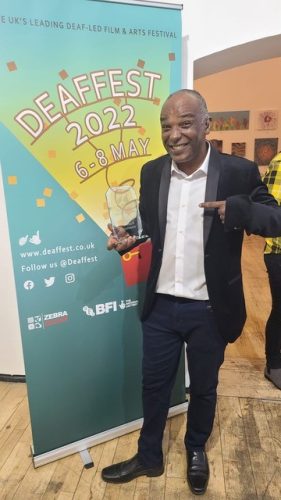
8. How would you encourage young deaf people to get involved in the Arts and in television?
You need a real desire and drive to succeed. My sister has been in the Arts for over 25 years – she started out because she liked art, sewing, printing, etc. She came up against difficulties, poor attitudes and communication barriers, but she kept going. She fixed her mind on where she wanted to get to, and didn’t stop working until she achieved it.
I’m the same. You need a strong mind set and you just keep going without giving up. If you come across barriers, you’ll overcome them if you’re determined enough. It’s important that our skills as deaf people are recognised in the art and media worlds, and there are lots of opportunities out there.
9. What do you love most about your work in Media?
I think TV presenting suits my personality perfectly. The people I work with at This Is Deaf are wonderful – they come to the studio kitchen and we can chat for hours together. Those are my favourite things about working in Media.
The in-vision translation work is done by Red Bee Media, they have such a strong team, with very skilled interpreters and deaf translators, and they work on all sorts of programmes – children’s shows, documentaries, movies, the lot. I think that’s amazing. I’m just getting started in that field, but what I love about it is the process of understanding the English and being able to translate what’s being said and explain the implicit meanings. I relish the challenges, especially the live shows such as the Paralympics.
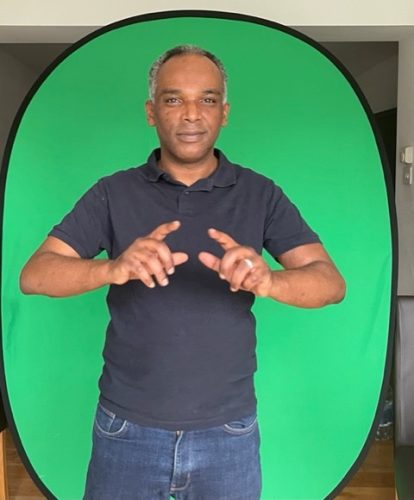
10. Who inspires you and why?
In the 1980s on Channel 4, there was a black presenter, Ray Harrison Graham. He was so charismatic. Seeing him in that role made me realise that I could do that too. They were both a big inspiration to me. Ray also worked on Vee TV as executive producer and as director and writer on Rush. He was incredible – he was so committed and had so much knowledge. He faced a lot of racism and it ignored it all and just kept on going. He has so much strength – mine is nothing compared to his. He was the first black deaf person to receive a Bafta and he showed me the award. He’s a big inspiration to me.
11. What ways do you think hearing people can be allies to the deaf community? Any DOs and DON’Ts?
I think it’s important that hearing people think about how to be an ally. If someone needs support or wants support, don’t take over and say that you can do it for them, or tell them what they want. Listen to what they’re saying and to the specifics of what they want support with. That’s being an effective ally. Often people are confused about allyship and think it’s saying ‘oh I can do that, I can set up everything for you’. But that just feels like you’re taking over. It’s not about rushing ahead of us and doing everything for us, it’s about being alongside us and working together. That’s allyship.
12. 3 top tips for deaf people?
I gave you some DON’Ts and now I’ll give you some brief DOs. My 3 top tips for deaf people would be that:
- It’s important to be confident, knowledgeable and committed.
- Hard work is the key.
- It’s important to keep going, to have a plan, and keeping the energy up because that gives you more energy.
Motivation to keep going is important too. I think I might have given you a lot more than 3!
To read more inspirational role model interviews, take a look here. If you would like to be an ally to the deaf community and learn sign language, check out our courses here.
Looking for more support? We’ve made it our mission to improve the lives of deaf people everywhere. Check out Deaf Unity’s projects to find out what we can do for you. If you’d like to get in touch, contact us here.

